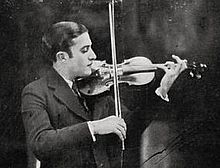Marcel Stern (composer)

Marcel Stern (4 October 1909 – 2 August 1989) was a French composer and violinist.
Life[]
This section does not cite any sources. (October 2019) |
Born in Paris, Stern studied at the Conservatoire de Paris and won the Premier Grand Prix de Rome in 1936 with the cantata Gisèle. After his stay at the Villa Medici in Rome, the Société Nationale performed his Divertissement for Orchestra in Paris in 1939.
The Second World War interrupted his musical career, but during this time he composed the Symphony "La Libération", which was premiered on the radio in 1945 and by the Concerts Colonne in 1948 at the Théâtre du Châtelet under the direction of Paul Paray. Among his other works are the Deux pièces pour flûte seule: Bucolique, Iberica (1964) and the Concerto pour piano et orchestre (1968). He also composed several transcriptions of works by other composers for violin and orchestra, including George Enescu's First Romanian Rhapsody.
Compositions[]
Classical works (selection)[]
- 1935: Cantata Le Château endormi (deuxième Second Grand Prix de Rome)
- 1936: Cantata Gisèle (Premier Grand Prix de Rome)
- 1939: Divertissement for small orchestra
- 1945: Symphony La Libération in E
- 1964: Bucolique and Iberica, two pieces for flute solo
- 1968: Concerto for piano and orchestra[1] (YouTube)
Cinema[]
Marcel Stern also distinguished himself in the field of film music. Thus, from 1946 to 1963, he was responsible for the scores of fourteen French films (two, however, being French-Italian co-productions).
- 1946: by and Maurice Cammage
- 1947: Not guilty by Henri Decoin
- 1948: Night Express by Marcel Blistène
- 1949: Vient de paraître by Jacques Houssin
- 1950: by Georges Péclet
- 1951: Avalanche by
- 1952: Love Is Not a Sin by
- 1955: Men in White by Ralph Habib[2]
- 1956: In the Manner of Sherlock Holmes by Henri Lepage
- 1957: by Pierre Chevalier
- 1958: by Raymond Bernard (Franco-Italian film)
- 1960: by André Haguet and
- 1962: Rencontres by Philippe Agostini (Franco-Italian film)
- 1963: by Philippe Agostini
References[]
- ^ Marcel Stern (1909-1989) : Piano Concerto
- ^ Similarly, à propos Ralph Habib, the IMDb above also mentions Law of the Streets (1956), mistakenly attributing the music to Joseph Kosma and Marcel Stern, while it is due to Émile Stern (which is confirmed by the notice of this film on Ciné-Ressources).
External links[]
- Marcel Stern on musimem.com
- Marcel Stern on Ciné ressources
- Marcel Stern on IMDb
- 1909 births
- 1989 deaths
- Musicians from Paris
- Conservatoire de Paris alumni
- French classical composers
- French male classical composers
- 20th-century French composers
- Prix de Rome for composition
- French film score composers
- French male film score composers
- 20th-century French male musicians